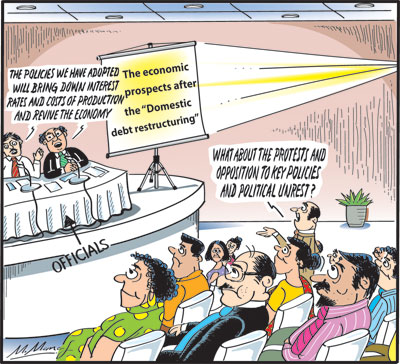Columns
Tough task of implementing reforms for economic recovery
View(s):Now that the domestic debt restructuring (DDR) has been accomplished, the foreign debt restructuring (FDR) should be completed soon.
Challenging
The challenging task ahead is the implementation of the needed economic reforms. Political parties would protest against these unpopular reforms and disrupt the economy.
Favourable
Hopefully, there would be a significant reduction in foreign debt obligations (haircut) and an extension of the periods for repayment of debt.
The stumbling block of the Chinese refusal to accept a reduction in debt appears to have been over-come. They have agreed to a bilateral arrangement that is expected to be similar to the agreement with other countries. We hope it will be even more generous than that of Paris Club members.
Other requisites
Debt restructuring, however important, is not a panacea for all our economic woes. The restructuring of foreign and domestic debt alone will not ensure an economic revival. It will not by itself ensure an economic revival. It is only a first step towards an economic revival and growth.
Economic reforms
The adoption of reforms and policies that revive the economy and put it on a path of economic growth and development is necessary for economic stabilisation, recovery and growth.
Economic reforms, however difficult and unpopular, are Imperative for economic development.
Difficult
This is no easy task. In the socio-political context of the country, there are severe constraints that ren-der reforms difficult to implement. Nevertheless, we have arrived at a point in our history when we have to reform or perish.
Opposition
In the first instance, the restructuring itself has led to widespread opposition, the main opposition be-ing the decrease in retirement benefits of the EPF and ETF members.
This discontent and opposition to the restructuring of domestic debt could lead to strikes, disruptions and social upheavals that could affect the economy adversely.
Discontent
At the same time, there is social unrest due to the dissatisfaction of Samurdhi beneficiaries, who have been left out of the new Aswasuma poverty alleviation programme.
Improvement
In spite of an improvement in the economy and easing of hardships, the months ahead are likely to be a period of political unrest.
Our party politics and culture of political protests enable opposition parties to exploit any discontent to organise strikes and protests and create social unrest.
Protests
Protests are imminent against the privatisation of state-owned enterprises, a key reform for fiscal sta-bilisation and economic growth. Implement
Similarly, other reforms too will face opposition. It is in the face of these protests that the country’s reforms have to be undertaken.
Setbacks
These protests and upheavals are setbacks to economic activities. They could even affect vital sectors of the economy, such as manufacturing industries and tourism.
Opposed
Ironically, even members of the ruling Sri Lanka Podujana Peramuna or Pohotuwa are opposed to debt restructuring, privatisation of state enterprises and other reforms.
Conspicuous
The abstentions of leading members of the ruling party at the DDR vote was a sign of coming developments.
Unity
The President’s call for all-party cooperation has fallen on deaf ears, though some members of the opposition may join for reasons of their own.
Protests
There could also be protests and upheavals against other aspects of the reform agenda and meeting of IMF conditions to achieve fiscal consolidation and monetary stability.
Privatisation
The privatisation of state-owned enterprises is an unpopular measure that would cause massive pro-tests engineered by political parties.
The ruling party is undoubtedly against privation and may be a party to these protests overtly or cov-ertly.
Poverty programme
Already there are country-wide protests against the new poverty alleviation programme, Aswasuma, which is expected to replace the current Samurdhi programme that is known to be a scheme that does not reach the deserving poor. More on this in future columns.
Conclusion
Now that the contours of the domestic debt restructuring are a fait accompli, the foreign debt restructuring that reduces our foreign debt obligations must be speedily settled and the economic policies and reforms needed for economic stabilisation and growth should be speedily implemented.
This, however, is a difficult task as reforms are politically unpopular and the opposition parties would spearhead protests and social unrest.
The domestic and foreign debt restructuring is only the first step on a long road to economic recovery, revival growth and development. The achievement of economic growth and development requires a number of reforms that are difficult to implement in our political culture.
Finally
The pertinent question to ask is whether the implementation of economic reforms is possible in this political and social context.
Buying or selling electronics has never been easier with the help of Hitad.lk! We, at Hitad.lk, hear your needs and endeavour to provide you with the perfect listings of electronics; because we have listings for nearly anything! Search for your favourite electronic items for sale on Hitad.lk today!


Leave a Reply
Post Comment